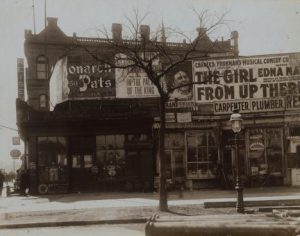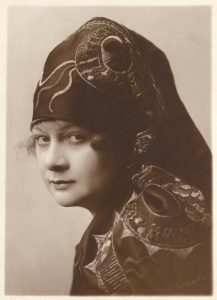
Still image of Reisenweber’s at 58th and Columbus Circle ca. 1900, image courtesy New York Public Library
By Claudie Benjamin
That laughter has a healing quality has been well documented by patients and clinicians through the ages. Right now, more than two years into Covid, the idea of going out, having a few drinks, listening to some music and having fun among large groups of people seems remote and dangerous. Will the spirit of a night out on the town ever return?
It’s worth googling Sophie Tucker, the grand dame of bawdy hilarity of almost a century ago; not only to laugh with this woman of endless quotable quotes, but to appreciate the lyrics of the songs she sings in cabaret style which address questions about sex, relationships, aging. money, personal independence and self-image in ways that remain relevant today.
Later embraced by NYC and an international star, Reisenweber’s Cafe at 58th Street and 8th Avenue in Columbus Circle was a significant turning point in Sophie Tucker’s rise in fame and familiarity as a household name.

Headshot of Sophie Tucker, undated. Via the New York Public Library
She clearly had the gift of gab from very early on. Born in the Ukraine, she arrived with her parents in the United States as a young child. Her parents opened a kosher deli in Hartford Connecticut and Sophie sang there to attract customers. She married, had a son, divorced and soon took off for NYC to make herself a career. She was overweight, didn’t feel beautiful and felt ashamed that producers of her earliest performances insisted that she perform in blackface to cover up her looks. Somehow, her makeup was lost on tour, she performed as she was, audiences loved her and she never performed in blackface again.
At Reisenweber’s in 1918 and then for decades on stages and clubs in the US, and in Europe (she performed until two weeks before her death in 1962 at age 80) she quipped on stage about her weight and looks. Years later, performer Bette Midler performed as a character named Soph, highlighting segments (though raunchier) inspired by Sophie’s performances. Watching these in combination with YouTube videos of Sophie’s herself make her fame understandable.
The atmosphere at Reisenweber’s may be harder to conjure. Beginning as a roadside tavern about 1856, Reisenweber’s was opened by John Reisenweber, when Columbus Circle was largely rural.
“The 1890s bicycle craze significantly increased demand for the tavern.” Reisenweber’s expanded over the next decade or so into a seven-floor complex of two buildings that included a 50 -room hotel.
In those days, the excitement of live entertainment was hard to match. In many ways the early teens and 20s of the 20th Century was when NYC established itself as the glittering metropolis that never slept. Apart from drinking, dancing and live entertainment, Reisenweber’s was known for all-men’s beefsteak dinners. One event of this kind was held to honor Mark Twain. As illustrated in a photo held by the Library of Congress, dozens of suited men wearing white butcher’s aprons, posed for a celebratory photo.
“These were not exactly elegant affairs. As a matter of fact, they were famed for their rather barbaric approach to the art of gluttony. They were exclusively male. The diners donned white butcher’s aprons and chef hats to eat steaks with their hands while sitting on boxes and barrels in an environment contrived to seem menacing. They used the skirt of the apron to wipe the grease off their faces. Napkins were not allowed.”
Sophie rose to fame during the dawn of movie making, though she later not only performed in films, but hosted her own radio show and appeared on TV.
Even in the early days, Sophie wore elaborate gowns and sumptuous furs as she strutted the stage night after night. Reisenweber’s was an enormous establishment with multiple venues including a roof garden and a Hawaiian themed restaurant. Patrons also select from a number of other club-like restaurants. Sophie performed at the 400 Club which was renamed the Sophie Tucker Room in 1919. It turned out that she had an affinity for the mood and pacing of jazz and adapted her singing to match. “Some of These Days” composed by Shelton Brooks became her signature song. No question, Sophie had endless energy and ambition.
“While performing at Reisenweber’s, Sophie landed a spot in the Shubert Gaieties of 1919 at the Winter Garden, her first Broadway role.” She described the stress and underlying thrill of being in demand, “J. J. Shubert sent for me to be the headliner at his Sunday-night concerts. I was cashing in on my success at Reisenweber’s, but I can tell you it took some hustling to do it. I would go on at Reisenweber’s for the dinner show, jump into a taxi, and race over to the Winter Garden to change my dress and close the bill of the Sunday-night concerts; then back to Reisenweber’s and another change of costume for the late supper show.”
An important item on Reisenweber’s historical timeline is the Original Dixieland jazz band. There’s even a Reisenweber rag. This band’s White musicians who were popularizing Black music made their first recording in 1917, “before the release of this recording, the only way to hear the ensemble was live, and the place to hear them live in New York was Reisenweber’s Cafe, one of the most fashionable clubs of the 1910s.”
Reisenweber’s was undone by Prohibition, “the restaurant was subject to frequent liquor raids and was closed for good in 1922.”
What was Sophie like as a person? She has been described as boastful, and proudly doing her own thing. She met up with international royalty, United States presidents and played cards with Al Capone. She was also kind. Many years after her Reisenweber’s performances, she was in Miami when the Black performer Josephine Baker came to town in 1951 to play the Copa City nightclub. Though she had made a reputation as a dazzling unabashed erotic sensation in Paris, the mood in Florida threatened racist-based disruption of her performances (which Baker insisted must be unsegregated). Sophie stepped in, introduced Baker on stage on opening night and quelled any potential protest. There was no violence and the show was a hit. That year, the two new friends were pictured on the May 1951 cover of Ebony Magazine.
Quoted widely in her time, some of Sophie’s capsulized quips on life, and money are still familiar today. “I’ve been rich and I’ve been poor. Rich is better.” Admirably, had a clear idea about her intent. “I’ve never sung a single song in my whole life on purpose to shock anyone. My ‘hot numbers’ are all, if you will notice, written about something that is real in the lives of millions of people.”
Watch a clip of Sophie Tucker on YouTube.
